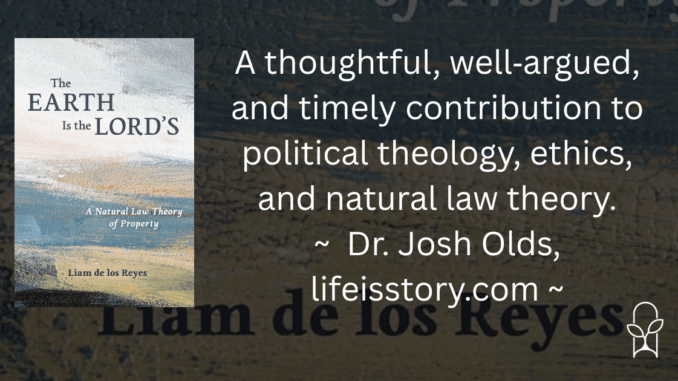
Series: Emory University Studies in Law and Religion
Published by Eerdmans on June 17, 2025
Genres: Academic, Non-Fiction, Social Justice
Buy on Amazon
Goodreads

What does the Christian tradition have to say about property and ownership?
The Earth Is the Lord’s offers compelling answers to this question. In this timely and thought-provoking book, author Liam de los Reyes presents a counterpoint from within the Christian tradition to both Lockean and utilitarian theories of property. Combining strong textual evidence and clear reasoning, de los Reyes sets forth a natural law theory of property based on key patristic, scholastic, early modern, and contemporary theological sources. This theory posits that all things belong properly to God; that God has given human beings the power to use the things of the world for their own flourishing; and that property as a convention ought to govern and distribute the things of the world in accordance with this divine purpose.
More specifically, de los Reyes argues that within the Christian tradition, property is a convention that gives expression to the political nature of humans by protecting certain principles of justice in how humans govern the material order, while leaving the determination of any one property regime open to a people’s political reasoning that takes into account that people’s historical, cultural, and environmental contexts.
De los Reyes’s theory is general enough to support a wide array of philosophical and theological theories of justice but also concrete enough to clarify many of the related critiques of capitalism and markets, making it of particular interest to scholars of ethics, religion, philosophy, law, and economics.
From its first page, The Earth Is the Lord’s unfolds with both intellectual rigor and an almost poetic sense of purpose. It’s a dense, scholarly work that—utilizing a background of Catholic moral and social tradition—invites readers into a world where questions of land, ownership, justice are tightly interwoven. The premise is deceptively simple: What does the Christian tradition actually say about property? Yet from that question blooms a rich and dense tapestry of history, theology, philosophy, and ethics.
De los Reyes begins with foundational historic voices, guiding the reader through the medieval scholastic theory that “all things belong properly to God” and that human property is a convention serving divine intent. It is in this historical context that De los Reyes builds his core claim that property is not a natural right but a socially instituted tool meant to secure equality, sustenance, and freedom.
A particularly compelling section traces how scholastics like Aquinas and later thinkers offered a vision of property that was intrinsically communal, limited by justice and oriented toward sufficiency rather than accumulation. De los Reyes grounds these historical sources with clarity and philosophical precision. He juxtaposes this tradition against John Locke’s liberal property theory, providing an effective critique of Locke such that where Locke frames property as derived from labor and natural entitlement, the scholastics see property as conditional on its promotion of the common good.
The Earth is The Lord’s then proposes a renewed natural‑law framework for the modern age. De los Reyes contends that property must serve basic access and distributive equity, must acknowledge communal limits, and must be flexible to historical, cultural, and environmental contexts. His framework manages to remain general enough to accommodate diverse political regimes—even democratic or capitalist ones—if they embed justice, equality, and sufficiency at their core. And there’s the heart of the book from a feasibility standpoint. This book isn’t just a simplistic “Capitalism bad!” screed (even if capitalism, as practiced by most today more than lends itself toward corruption).
The latter half of the book engages Catholic social teaching and contemporary debates. Here, De los Reyes shows that his natural law theory is workable. It’s able to critique neoliberal capitalism while affirming legitimate market structures—when they uphold human dignity, communal responsibility, and sustainable sharing.
The Earth is the Lord’s offers a moral imagination rooted in Christian natural law that challenges the assumptions that private property is absolute, that capitalism is just, and that the individual right to accumulate things outweighs communal flourishing. (Which, when worded that way makes that assumption sound kind of silly.)
In sum, it’s a thoughtful, well‑argued, and timely contribution to political theology, ethics, and natural law theory. It’s not an easy read. I’d love to see a layperson version of this work because I think it would have some impact beyond just the academics who will read this version. The only question I have remaining is how we actually put this thinking into practice.
